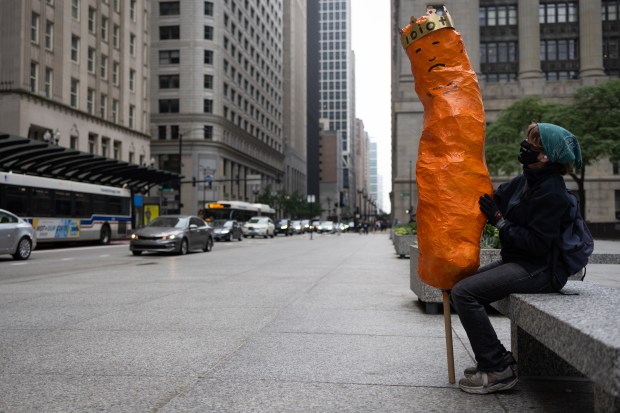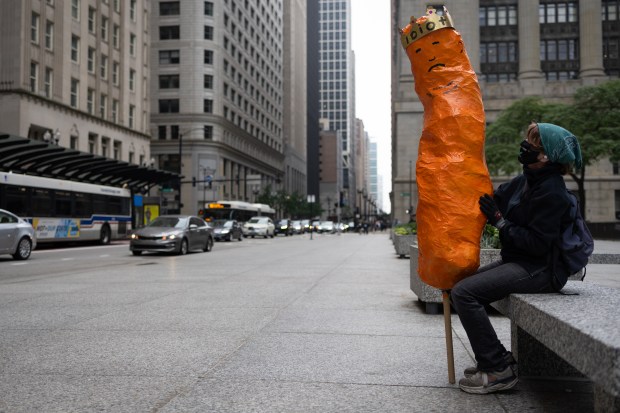In olden times, the phrase “going Hollywood” carried a double-edged sword. It signified great things (fame, riches, dancing with “sun-kissed babies,” as the 1933 song “Going Hollywood” put it) as well as dubious ones (selling out, grasping for dollars, prostitution of one kind or another).
Last week Gov. J.B. Pritzker went Hollywood, with high hopes for strengthening the economic health of Illinois’ film, TV, streaming and advertising production industry. In time, we’ll see if his charm offensive has helped generate additional screen projects for the state.
Pritzker and his team took meetings all over the place: Netflix, Apple, Amazon Prime, Warner Bros., Discovery, Paramount. In collaboration with the nonprofit Illinois Production Alliance and Illinois Film Office head Peter Hawley, as well as other Illinois industry advocates, the governor hosted a luncheon at the Beverly Hilton followed by a reception/sales pitch — branded with the name “Iconic Stories: Made in Illinois” — on the NBC Universal lot in Universal City.
This was a first for Pritzker, and with the Illinois Film Production Tax Credit offering a competitive 30% rebate on qualified in-state productions, Illinois now ranks with a handful of other popular filming states, among them Georgia, Louisiana and New Mexico. A majority of U.S. states (currently 37) offer some form of production tax incentive.
Is it worth it? A recent New York Times feature painted film and TV tax credits as money better spent in other ways, using what happened with Michigan’s arguably gullible degree of tax rebates ($500 million) spent to get medium-sized starry projects (Clint Eastwood’s smash “Gran Torino”) and massively budgeted franchises (“Batman v Superman: Dawn of Justice”) to film in Detroit and elsewhere. A change in the Michigan political administration turned the spigot off, though film production incentives may be returning in a more modest form.
I talked to Gov. Pritzker and, separately, Illinois Production Alliance executive director Christine Dudley about last week’s flurry of Los Angeles sit-downs and meet-ups; what Georgia offers filmmakers in tax incentives that Illinois doesn’t; and, inevitably, “The Bear,” now filming its third and fourth seasons in Chicago.
The following has been edited for clarity and length.
This was your first official Hollywood pitch meeting, two days’ worth, designed to sell Illinois to those not currently filming here. First question: How long, from the start of the average meeting you took, did it take for someone to mention “”The Bear”?
Pritzker: Not long at all (laughs). “The Bear” came up in every single meeting. Partly because it’s a recent and ongoing Chicago success story, and because Chicago itself is such an important part of it. People like that; they like the depth and texture of the locations. Rival studios (to FX, home of “The Bear”) mentioned that over and over.
Over the last couple of years, the Illinois production tax credits have improved in the eyes of the production world. When I came into office in 2019 we had about $400 million in production expenditure. By 2022, we reached almost $700 million. Many people I talked to hadn’t heard about the extension of the Illinois tax credit through 2032. That was met with a very encouraging response. A 30% tax credit has put us in a category with the states getting the most business. Georgia’s in a category all by itself, a very generous and attractive place. I heard that from everybody.
Christine, can you break down how tax credits work?
Dudley: Sure. Some of the history can be attributed to the second Mayor Daley of Chicago. (In late 2001 and early 2002) the movie “Chicago” was filmed in Toronto; the Canadian tax incentives had been luring runaway U.S. productions for years already. Daley was, like, what’s going on here? “Chicago” is filming in Toronto?
Illinois and Georgia were among the early adopters on a state level of production tax incentives. Georgia had to build everything from the ground up, basically — all the (filmmaking) infrastructure. Whereas in Chicago (film production) was already a legacy industry. So Georgia made concessions allowing for all expenditures, including non-resident wages, to qualify for their tax incentives.
So, Robert Downey Jr. comes to Atlanta for an “Avengers” movie, shooting green-screen work on a soundstage, and the studio paying his astronomical salary is rewarded with a 30-40% tax rebate. Then the star goes home. The money doesn’t stay in Georgia, essentially.
Pritzker: In Illinois the above-the-line expenditures (for leading actors, directors, etc.) have a $500,000 cap in place. If you uncap it, and you have a movie shooting in your state with three big stars, each getting 10 to 15 million dollars, that basically wipes out a lot of the tax credit altogether. In our meetings last week sometimes I’d walk in and start by saying, “Look. We’re not Georgia. We’re not going to hand you bags of cash when you cross the border into Illinois. But we have a very good tax credit, and we have advantages other states don’t.”
I pointed out to them: When you go to Georgia, you know that some of your cast, your crew, are unwelcome there. Why? Because maybe they’re LGBTQ. We all know what the social and political policies are in Georgia. And Illinois is the opposite. We protect everyone’s freedoms here. And what I heard in those meetings, from the industry leaders, is that yes, that matters to a lot of their people. It’s an important non-financial consideration.
I also pointed out that the number of square feet of soundstage (in Illinois) is approaching a million. That surprised a lot of people who aren’t currently working here. We have 2,500-plus film crew workers, and we’re adding 200 to 300 every year through our workforce development program and 75% of those people are people of color or women. All that was very attractive to everybody I talked to last week.
What’s your counter-argument to those in government or anywhere, really, who hear the words “tax incentives” and cry BS, that it’s a waste of public money?
Pritzker: The Illinois Production Alliance commissioned a 10-year independent study to evaluate the (production tax incentive’s) direct and indirect benefit to the state. It showed that almost seven times of the money spent (on production incentives) is returned to the taxpayers of Illinois. When I came into office I asked the same question, when people were talking about extending the tax credit through 2032. Are we making money on it? Are we losing money?
Where we set the tax credit, at 30%, mostly for below-the-line production spending, we end up roughly even in terms of direct benefit to the state. Basically a wash. But remember: We’re employing thousands of people. These people buy goods, they’re living in leased housing, they’re buying lumber and gas and groceries. The indirect benefit is nearly 7 to 1, and that’s a tremendous benefit in jobs and economic growth.
Dudley: It’s the ripple effect. When I was state film commissioner I went on the “Chicago Fire” set and talked to the guy who does the pyro. He’s the expert in pyrotechnics, which is important to that show. He lives in McHenry County. I asked him: What’s the practical benefit of this show being filmed here? He said: “Simple. I don’t have to get on a plane every week to do my job out of state. I put gas in my car here. I drive over to Cinespace Studios in Chicago. I take my family out to dinner. I train new people in. All here.”
Pritzker: Some producers last week told me: “Gee, we’d love it if you’d uncap the above-the-line expenditures.” And my answer was, “Look, it’s my job to make the best deal I can with you on behalf of the taxpayers, so that you do well on your productions. But the Illinois taxpayers have to do well, too.” They acknowledged that Georgia basically gives the store away.
We’re putting people to work. And we’re actually profiting, in the broadest sense, by employing a whole lot of people who spend money here and pay taxes here.
Michael Phillips is a Tribune critic.





